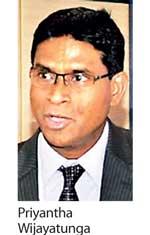18 Jul 2019 - {{hitsCtrl.values.hits}}
Lack of progress in enhancing energy sector governance hinders renewable energy development in Sri Lanka, whereas its neighbours are already speeding ahead with renewable energy development backed by improved energy sector governance, an energy sector expert opined.
“As one can see, Sri Lanka still needs to go a long way in relation to sector governance, compared to other countries in the region. It is time that we look at this closely so that we do not lag behind. Reforms will undoubtedly help the energy sector and hence the country’s economic development,” Asian Development Bank (ADB) South Asia Energy Division Director Priyantha Wijayatunga said.
He made these remarks recently at the launch of the Techno 2019 exhibition in Colombo.
He specifically pointed out that improved governance in the energy sector in India and Bangladesh enormously helped conceptualising and implementing clean energy initiatives, while enhancing their energy security.
He highlighted the important role played by independent energy regulators and separation of functions of the energy sector in these countries, which had paved the way for breakthroughs in clean energy initiatives.
Interestingly, Sri Lanka’s Power and Renewable Energy Minister Ravi Karunanayake recently proposed to the Cabinet to trim the economic and regulatory powers of the country’s energy sector regulator, the Public Utilities Commission of Sri Lanka.
“The supply industry has gone through structural reforms and has been unbundled both vertically and horizontally in most of these countries, separating generation, transmission, distribution and supply. Also along with it, institutional reforms swept through separating policy-making from utility business and establishing independent regulation.
By now, a large majority of the countries, including many in the developing world around us, have fully unbundled the energy supply industry with a reasonably independent regulatory environment. If we look at South Asia, India and Bangladesh have already significantly advanced and are rapidly progressing in these areas,” he elaborated.
Further, Wijayatunga noted that reforms also led to an increase in private sector participation in all sub sectors, including generation, distribution and even in transmission business in these countries.
The Ceylon Electricity Board has a monopoly on the power sector, with an affiliate distributing electricity in some areas.
He also stressed on the need for tariff reforms for cost recovery in the sector in parallel with emphasis on increasing access to electricity, pointing out that regardless of size or economic status, most of Indian states have now achieved unbundled power sector institutions and independent regulation.
Although Sri Lanka launched many initiatives such as mini and micro hydro sector, wind and solar power, net metering, etc. the country lags behind broadly in expanding them, whereas countries such as Bangladesh and India made significant progress in replicating these initiatives.
“In fact, Sri Lanka’s solar home system programme was the one replicated in Bangladesh later, now with over five million solar home systems. Small hydro developers, who came up in Sri Lanka with these policies, went to Africa and Southeast Asia for similar investments later. We really would like to see Sri Lanka continuing on these great initiatives with a stronger and more progressive commitment,” Wijayatunga said.
15 Nov 2024 14 minute ago
15 Nov 2024 27 minute ago
15 Nov 2024 39 minute ago
15 Nov 2024 1 hours ago
15 Nov 2024 2 hours ago